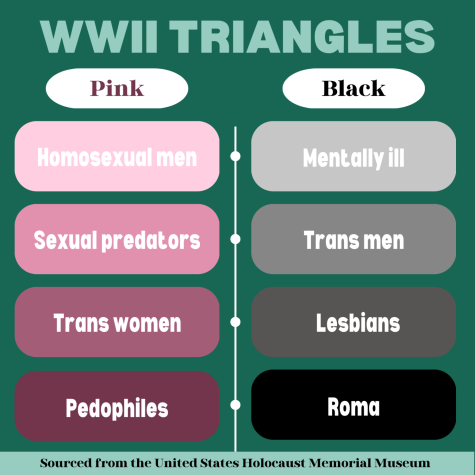Murdered for existing
April 24, 2023
The issues do not just end at censorship and banishment — in fact, this is just the tip of a much larger iceberg. During World War II, citizens suspected of being LGBTQ+ were forced into concentration camps.
Though homophobia and transphobia existed far before World War II, discrimination became especially prominent — specifically in Germany — as the war grew. Along with Jewish people, political prisoners and those considered “asocial,” LGBTQ+ people were involuntarily removed from their homes and relocated to deadly concentration camps, though they were not specifically targeted for murder in the same way that Jewish people and Jehovah’s Witnesses were.

To distinguish each group from one another, prisoners would wear triangles on their clothes. The pink triangle, recently reclaimed as a symbol of LGBTQ+ pride, was worn by homosexual men, rapists and pedophiles. The black triangle was worn by those deemed “asocial” — those who did not conform to social norms — including Roma, those with mental illnesses or disabilities, drug addicts, beggars, prostitutes and lesbian women. By making these distinguishments, the triangle categories insinuated that gay men fell under the “sexual predator” umbrella and lesbian women were “asocial.” These harmful categorizations continued to enable long-held societal ideas that members of the LGBTQ+ community were strange, predatory or mentally ill.
In upholding the stereotypes surrounding LGBTQ+ people and sending them away to concentration camps, Nazi actions contributed to future discrimination against LGBTQ+ people, furthering the idea that people who “don’t fit the norm” should be sent away altogether.
However, homophobia is not solely an issue of the past. While there may not currently be issues such as mass relocations of LGBTQ+ people during wars, the LGBTQ+ community is still targeted by those with malicious intent. More recently, this is seen frequently in mass shootings and other hate crimes across the globe.
On Nov. 19, a shooter opened fire on Club Q, an LGBTQ+ club in Colorado. Five people died and many more were injured. The five victims included bartenders 28-year-old Daniel Davis Aston and 38-year-old Derrick Rump, 40-year-old transgender woman Kelly Loving, 35-year-old Ashley Paugh and 22-year-old Raymond Green Vance. Pulse nightclub, an LGBTQ+ nightclub in Orlando, was also targeted in 2016, leaving 49 dead and 53 injured. The community recognized the victims through a memorial and museum, though the mourning of those whose lives were lost never truly ends. These hate crimes murdered LGBTQ+ community members, people who were simply trying to exist in a space that they were told was safe. Nobody goes to a club expecting to be killed just for trying to exist; sadly, this was the case for over 50 people who attended Club Q and Pulse nightclubs on those days.
These shootings are just two instances out of over 10,000 hate crimes committed based on sexual orientation in the past 10 years; hate crimes against a community based around love and identity. Instances like these make us wonder, “Could I be next?” Not only do these hate crimes take away loving LGBTQ+ family members and friends, but they create a long-lasting sense of paranoia and fear, leading LGBTQ+ individuals to participate in a more cautious lifestyle than that of their peers.
Nobody should be subjected to the unnecessary mental strain of paranoia and grief, regardless of whether others agree with their identity, and nobody should be targeted because of their identity. Hate crimes take an incredible toll on LGBTQ+ individuals, and it is essential that we work to prevent these from happening through education and stricter anti-discrimination policies.
